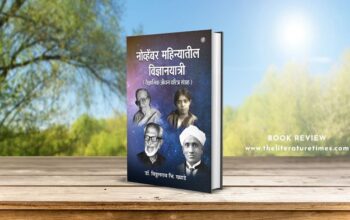A Tightrope Oracle by Mayur Deshpande is a hauntingly beautiful and deeply humane novel that blends magical realism with stark social reality, bringing to life the journey of a young girl, Sarsi, whose extraordinary gift becomes both her power and her burden. Set in the margins of Indian society, among the often overlooked Javmalsi street performer community, the story pulses with raw emotion, spiritual depth, and moral complexity. It is not just the story of one girl’s peculiar ability to see glimpses of the future, it is the story of a people, of resilience, and of how extraordinary light can emerge from the harshest shadows.
From the very first chapter, Deshpande plunges the reader into Sarsi’s world, a world of dust-laden streets, makeshift performances, and meagre earnings that sustain a family clinging to dignity through tradition and faith. Sarsi’s father, Rameshwar, is a dreamer and a believer. Her mother, a quiet yet resilient figure, brings rhythm to their daily grind with the beat of her drum. Sarsi, barely nine, is both a performer and a symbol of hope. When she suddenly sees a terrifying vision of an impending accident while walking the tightrope, and saves several lives, her world begins to shift. What follows is not a fairy tale of sudden riches and fame, but a slow, grounded evolution of a girl who must learn the cost of her ability to see into the future through car windshields.
What makes the novel so compelling is its balance between the mystical and the real. Deshpande doesn’t let Sarsi’s powers become a narrative shortcut. Instead, he layers her gift with nuance, doubt, and consequence. Her visions are never fully controllable, and her attempts to intervene in fate often result in heartbreaking unintended outcomes. This philosophical tension between fate and free will, between doing good and doing harm unknowingly, elevates the narrative into a deeply thoughtful meditation on morality. Can we really change destiny? And if we can, at what cost?
The richness of the book also lies in its characters and their emotional arcs. Rameshwar’s devotion to his daughter is portrayed with tenderness and conviction. He is both awestruck and afraid of her power. His spiritual interpretation of her gift that she is an avatar sent by Lord Vishnu reflects the faith many marginalized communities turn to when institutional systems fail them. Sarsi’s journey is made even more poignant by her relationship with Shamu, the kind-hearted factory worker she eventually marries. Their love is rooted in mutual respect, and though quiet, it lends Sarsi the strength she needs to carry her growing burden.
The novel does not shy away from the darkness that often creeps into the lives of the vulnerable. The moral grey zones become apparent when Sarsi refuses a businessman’s proposal to misuse her powers for stock market gain. This refusal, and the tragic aftermath of his suicide, underscores the ethical dilemmas she constantly faces. Sarsi is not a superhero. She is a girl carrying a divine, dangerous gift, trying to do her best in a world that alternates between worship and suspicion.
Deshpande also makes a powerful political statement through the book’s later chapters, especially when the Javmalsi community becomes the target of an unjust crackdown by a corrupt politician. Here, Sarsi must step out of her role as a passive seer and into that of an active agent of resistance. The courtroom drama, led by a young and inexperienced lawyer funded by the collective strength of the women, is both moving and symbolic. It is not just about justice, it’s about reclaiming dignity. And it is in these moments, where the community comes together under Sarsi’s guidance, that the novel radiates its brightest light.
Told partly through the eyes of a city journalist an outsider who becomes deeply entangled in Sarsi’s life, the story gains another layer of introspection. His journey from a disillusioned corporate employee to someone inspired by Sarsi’s conviction mirrors the effect her presence has on everyone around her. Even when the plot takes a tragic turn involving Nathu, a boy caught in criminal traps, the story does not seek dramatic closure. Instead, it leans into complexity, showing how every choice made from love can still lead to pain.
Mayur Deshpande’s writing is evocative and lyrical without ever becoming overwrought. His attention to the smallest of details, the texture of a rope, the glint of a car windshield, the silence in a courtroom, is exquisite. He crafts Sarsi’s world with authenticity, care, and empathy. What’s most impressive is that despite the spiritual undercurrents and fantastical premise, the novel never loses its grounding in lived realities: poverty, marginalization, corruption, and moral compromise.
A Tightrope Oracle is not just a coming-of-age story or a magical tale, it is a mirror to society’s blind spots. It forces us to see those who live on the fringes not as charity cases or background noise but as people with agency, depth, and vision sometimes, quite literally. Through Sarsi, Deshpande gives us a heroine who doesn’t seek fame or vengeance. She seeks understanding, compassion, and a better future for all, not just herself. Her tightrope walk is symbolic of the delicate dance between hope and despair, faith and doubt, vision and responsibility. In a world obsessed with spectacle, Sarsi reminds us that true power lies in humility, in listening, and in quietly showing up for others even when no one is watching.
This novel will stay with you long after the last page is turned. It is rare, raw, and radiant.



